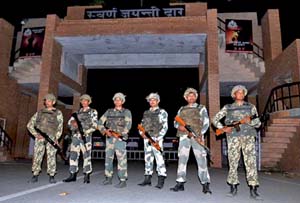Attari (Punjab), Nov 3: A symbolic Retreat ceremony for the lowering of national flags and closing of border gates took place Monday at the Attari-Wagah joint check post between India and Pakistan following a deadly suicide bombing near Wagah Sunday which left over 60 people dead.
Senior Border Security Force officials said border guards on both sides had agreed, on a request from Pakistan Rangers, that the Retreat ceremony will not be held for three days. However, the Pakistani side disregarded its own request and allowed visitors on their side Monday.
"A brief, truncated version of the ceremony was held today (Monday) evening. No visitors were allowed on the Indian side though a few hundred spectators were strangely present on the Pakistan side," a BSF officer here told media persons.
The visitors on the Pakistan side could be heard shouting pro-Pakistan slogans. On the Indian side, only a few BSF troopers were there to watch the ceremony.
"We are very disappointed to miss the ceremony here. The BSF did not allow people to go near the border gates. We travelled hundreds of kilometres to see this ceremony," said Santosh Kumari, who had come here with her family from Odisha.
Following the blast near Wagah, just 500 metres from the border gates Sunday, the BSF here has been on high alert.
"Our side is completely secure. We are monitoring the situation closely," BSF's Punjab frontier Inspector General Ashok Kumar said Monday.
The BSF has increased vigil at the joint check post and also along the barbed wire fenced international border in Punjab, especially in the Amritsar sector.
"There was a big bang followed by a lot of smoke on the Pakistani side. From our watch towers, we could see a lot of movement there with sirens and flashlights. There was panic all around," a BSF trooper along the border gates said.
"Activity on the Pakistan side of the border gates was normal today (Monday) in the daytime. BSF and Pakistan Rangers commandant-level officers also had a meeting," a BSF official said.
Land border trade between both countries did not take place Monday."We will review the situation on Nov 6," Commissioner for Customs Sunil Kumar said.
Scores of trucks from both countries transport products for trade every day.However, the Samjhauta Express peace train between both the countries arrived here from Lahore.






Comments
Add new comment